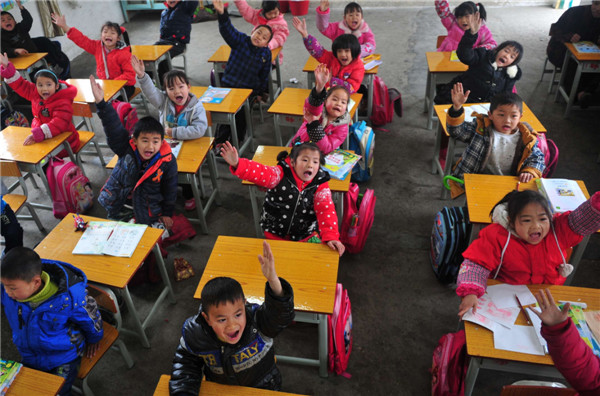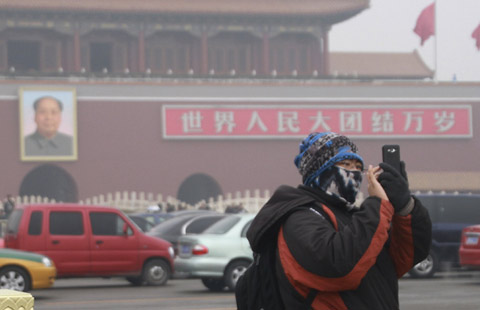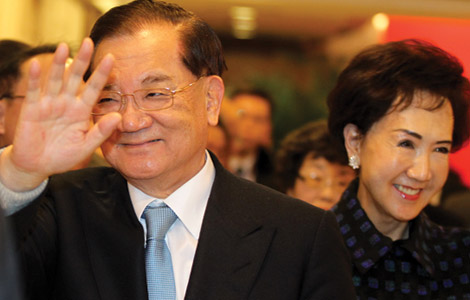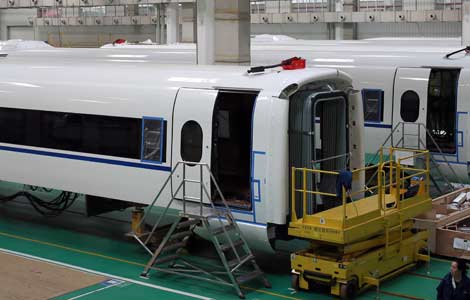School mergers to benefit students
Updated: 2014-02-21 09:23
By Cao Yin in Beijing and Luo Wangshu in Chongqing (China Daily)
|
|||||||||
 |
|
First graders in a experimental primary school in Ganyu county, East China's Jiangsu province, in class on Feb 17. |
The system overseas
Gao also foresaw difficulties and proposed that the education authorities should learn from other countries. "In Japan, public schools are the responsibility of local governments, meaning there is no difference in quality between urban and rural schools," she said.
The regulations governing schools in Japan provide strict standards for the use of facilities, "which leaves no gaps among schools", she said.
To reinforce the system, Japan's Education Civil Servant Law states that teachers in public schools are regional civil servants and details the rotation mechanism.
In Japan, teachers care more about their careers instead of worrying about which school they serve, and they are fully conversant with the country's rotation mechanism, according to Gao.
The local government pays teachers according to their experience and is responsible for their assignment to different schools. The system relieves teachers' natural concerns about income differentials, she added.
In Gao's view, the provision of legal support and well-prepared facilities are of paramount importance and must be ensured before any rotation mechanism is implemented.
In terms of basic education, the government should treat all schools as equals. However, over the years the education authorities have injected a greater amount of funding into key schools, thus jeopardizing the chances of equal development and possibly even leading to discrimination in favor of more-prestigious establishments.
Gao said it would be difficult to implement the rotation system if the majority of teachers refuse to take part, but stressed that they should not be blamed or accused of being selfish, "because society has not provided the soil for them to think in that way for long time".
Tan praised the rotation method used in Japan and suggested that local governments should play an important role in narrowing the divides between schools in China.
They can provide financial support to balance facilities in every school, and provide a transport subsidy for rotated teachers, many of whom will have to travel long distances to work, he said.
"In every change or improvement, some people will end up paying a price," he said. "If our educational staff object and don't want to give up their own interests, it will be difficult to make the dream of balanced education and equitable resource allocation become a reality."
Gao was still cautious, though. "To avoid the risk of the rotation mechanism devolving into empty talk or simply failing midway, we'd better think twice and take things slowly to ensure we get it right," she said.
Contact the authors at caoyin@chinadaily.com.cn and luowangshu@chinadaily.com.cn
Ji Jin contributed to this story.

 Beijing issues 1st yellow alert for smog
Beijing issues 1st yellow alert for smog
 Beauty queen the latest victim in Venezuela unrest
Beauty queen the latest victim in Venezuela unrest
 Italy court finalizes Berlusconi divorce
Italy court finalizes Berlusconi divorce
 Neighbors keen to open trade corridor
Neighbors keen to open trade corridor
 Beijing wants more cross-Straits contact
Beijing wants more cross-Straits contact
 Spirit of adventure lives on in Antarctic
Spirit of adventure lives on in Antarctic
 Prince Charles dances in traditional Saudi dress
Prince Charles dances in traditional Saudi dress
 Maglev trains speeding toward greener future
Maglev trains speeding toward greener future
Most Viewed
Editor's Picks

|

|

|

|

|

|
Today's Top News
Growth in emerging economies to decline: IMF
IPhone makes gains in China
CPPCC prepares for annual session
Shale gas in China can learn from US
China lacks innovation: experts
US needs to do more to attract FDI
Sex workers avoid HIV programs
Chinese economy endeavors to maintain stable growth
US Weekly

|

|







